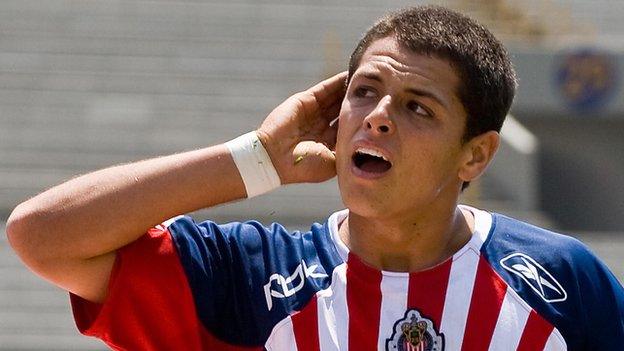The vitamin tycoon who boosted Javier Hernandez's career
- Published

Javier Hernandez won the Premier Division title of Mexico in 2006
"It was me who gave 'El Chicharito' his debut," says Jorge Vergara belligerently.
Clearly the multi-millionaire owner of Mexico's most popular football team, Club Deportivo Guadalajara - or Chivas to give them their nickname, is not a man who hides in the shadows of the boardroom.
In an era when directors and owners of football clubs are becoming as well-known as their managers, Vergara has no qualms about meddling in on-pitch matters.
Manchester United striker Javier Hernandez's senior bow for Chivas, as a teenager in 2006, was a case in point. Now 23, Hernandez, who is widely known by his nickname Chicharito - which translated into English means 'little pea', established himself quickly at Old Trafford, helping United to their 19th League title last May., external
"The then-coach didn't want him to debut. It is amazing how some coaches think," Vergara recalls with a headshake of derision. "So I kind of threatened him and said 'If you don't want him, I'll take him to the United States'."
It was no hollow threat. Since Vergara took over Chivas in 2002, he has expanded the brand to launch teams in the United States and China.
The original club is based in Mexico's second city, Guadalajara, where Vergara is from. He made his fortune through vitamin supplements and moved into football by buying his local club when it was at its lowest ebb, on and off the pitch.
"It was financially broke. Sports-wise it was a complete failure and it was in really deep trouble," Vergara, who is also a film producer, adds.
"So we launched new marketing strategies, we cleaned up the shirt which had 30 different sponsors on it, to dignify the brand. We started to recruit youngsters to build for the medium to long-term rather than just from one season to the next."
He also built the club a beautifully designed new ground, the Omnilife Stadium,, external named after his vitamin supplements company. Manchester United travelled to Guadalajara to play a friendly against Chivas to unveil the new stadium, external as part of the deal which took Chicharito to Old Trafford.
The philosophy of Chivas is based on two things: youth and Mexico. Chivas is almost unique in the world for fielding only Mexican players.
"The other team doing this is Athletic Bilbao. But it's harder for them, they can only choose from the Basque country," Vergara says.
As well as Hernandez, other promising young players to emerge from Guadalajara include Arsenal's Carlos Vela and Fulham defender Carlos Salcido.
So how does it feel to be known as the man who sold 'El Chicharito' to Manchester United in April 2010?, external
Vergara agreed to sell the Guadalajara-born striker to United for a fee believed to have been about £6m.
"People say it was a steal. Well, I did make 25,000% profit on him, so it wasn't that bad," he says.
Plus, the deal helped put Chivas on the map. "It opened doors for us," Vergara says. "It has been good for Mexico too. [Hernandez] has given people another impression of Mexico and of success here."
This season, however, success has been noticeably lacking at Chivas. The team have only gained a single point from six fixtures, leaving them firmly planted to the bottom of the table.
On the day BBC Sport met Vergara, Chivas lost at home 2-0 to Tijuana, prompting the coach Fernando Quirarte to resign. He was the 15th different coach during the Vergara reign.
While the team's emphasis on youth is admirable, it is no guarantee of trophies for Mexico's most-successful team. Some fans fear the club is becoming a feeder team for Europe's elite and any future 'Chicharito' will be out of the door before Chivas can reap any benefit.
But Vergara has dismissed these concerns. "We want this to become the best team in the world," he says, without a hint of irony.
"El Chicharito is an example of what we want to create.
"We want 11 like him. Not just how he plays, but who he is, the principles he works by and what he believes."
It is a sentiment most Manchester United fans would undoubtedly echo.
- Attribution
- Published15 February 2012